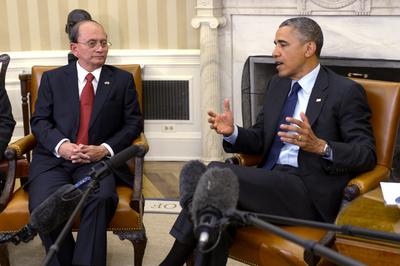But it is inaccurate to portray the former military Junta as a completely submissive satellite of Beijing.
In the lead up to the transfer of power in 2010, China supported the reform process on the assumption that its dominant access and influence would remain largely undiminished. Yet the direction and intensity of internal reforms and the movement towards normalisation with Washington has caught Beijing off-guard.
In 2009, the Obama administration began a gradual recalibration of its Myanmar strategy towards opening limited and conditional diplomatic channels. Impressed by the level and commitment to widespread reforms, Washington drove headlong into a rapprochement with Naypyidaw by mid-2011. The United States (along with many Western partners) has not only restored full diplomatic relations but lifted most financial and investment restrictions, with the exception of targeted sanctions against certain persons, and sectors such as mining which are still largely controlled by the military. The importance of this new relationship was underscored by the reciprocal state visits made by President Thein Sein and President Obama in 2012 and 2013.
Washington’s re-engagement with Myanmar coincides with its Asian ‘pivot’ (now named ‘rebalance’) in foreign policy. Despite this, the Obama administration has repeatedly emphasised that its relations with Naypyidaw are grounded in a ‘principal policy’ conditioned on continued governance and human rights reforms and are not directed against China — though there is a convenient congruence between Washington’s promotion of democracy and human rights and its wider geopolitical goals of using Myanmar to extend influence in the region.
Beijing is not convinced. It views the United States’ Myanmar strategy as being directed at ensuring American primacy in the region at its expense. Myanmar is an important state to Beijing for many reasons, including the preservation of ethnic stability along the Chinese border; the large amount of in-country investment, especially in natural resources; the presence of a large Chinese diaspora community; and Myanmar’s strategic position within Southeast Asia adjacent to the Bay of Bengal and the Indian Ocean.
Still, unlike its vocal criticism of Washington’s perceived interference in other regional matters such as maritime disputes in the East and South China Seas, Beijing has largely stayed silent on Naypyidaw’s new relations with Washington. Instead, it has embarked on its own recalibration strategy to adjust to the changing realities of Myanmar politics.
Beijing has begun to engage multiple actors beyond the military and Thein Sein government. These include the Union of Solidarity and Development Party and the National League of Democracy (NLD). Attempts to forge ties with the NLD have gathered pace with the recent visit of China’s Deputy Foreign Minister to NLD headquarters, in a move which perhaps paves the way for an eventual visit to China by Aung San Suu Kyi. This multi-pronged strategy demonstrates Beijing’s appreciation of the multi-polarity that defines Myanmar politics and its determination to interact with whichever entity is in power.
With Beijing positioning itself to work with any future government, it remains unclear the extent to which Washington will condition normalising relations on the attainment of a minimum level of compliance with democracy and human rights ideals. In light of the faltering constitutional amendment process, and the very real prospect of the military’s continued political involvement, Washington will have to balance its ‘principal policy’ with its wider geopolitical interests. In all likelihood, even if the 2015 elections do not meet Western standards of freedom and fairness, Washington will continue to deepen relations as long as there is no overt return to authoritarian rule.
Washington has begun to tentatively reach out to the Tatmadaw, allowing them observer status in the Southeast Asian military exercise Cobra Gold. Recent US State Department pronouncements have also suggested that, if reforms continue, arms sales to Myanmar are a real possibility. By building trust, contacts and relationships in Myanmar, these efforts will gradually dilute the Tatmadaw’s exclusive relationship with Beijing. This is a delicate process for the Tatmadaw: in many ways, it is still wary of Western intentions, and has maintained close military ties and arms sales with China. And although China accepts growing economic and political competition, any eroding of its strategic and military relations with Myanmar will most likely elicit a stronger reaction.
Beijing acknowledges the growing diversification of Myanmar’s foreign relations, but remains concerned about any moves of alignment towards the West. And at the same time as not wanting to be seen as a client of China, Naypyidaw also recognises the importance of maintaining relations with its giant neighbour and largest trading partner. As the ASEAN Chair, Naypyidaw will have to carefully navigate delicate matters such as competing maritime claims in the South China Sea between ASEAN members and China. This will test its ability to walk a sensitive geopolitical fault line. Washington will no doubt take note of its performance.
Ultimately, Myanmar is not just a bystander but is actively involved in maximising benefits from the growing competition between Beijing and Washington. Myanmar will most likely attempt to balance a neutral policy of non-alignment with both great powers. An important question in coming years is whether the wider geopolitical context will overshadow and lessen scrutiny over Myanmar’s continuation of democratic reform and national reconciliation.
Adam P MacDonald is an independent researcher based in Halifax, Canada.

